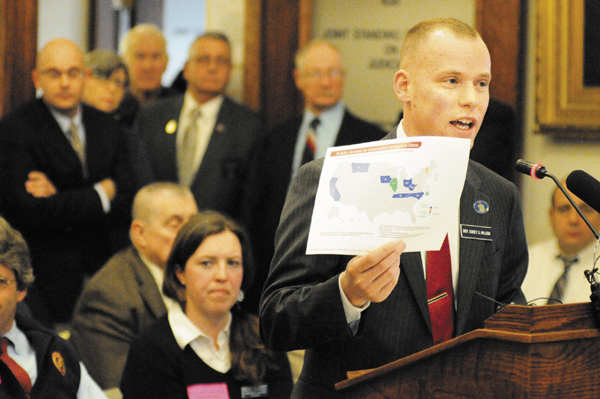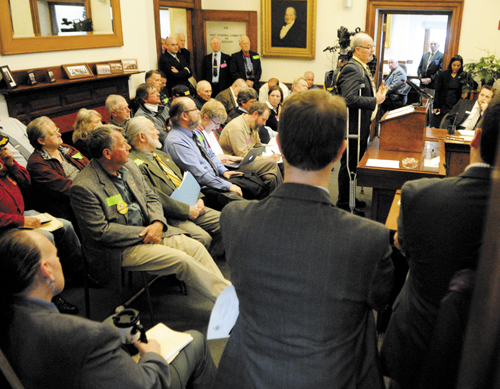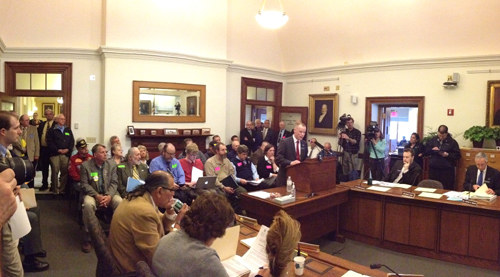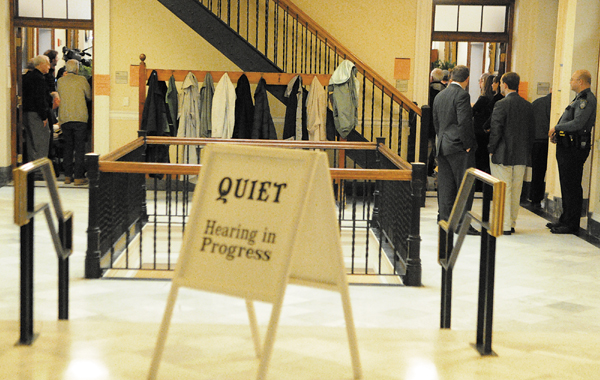AUGUSTA — Testimony Tuesday ran heavily in favor of a bill that would shield the privacy of Maine concealed-weapons permit holders.
L.D. 345, sponsored by Rep. Corey Wilson, R-Augusta, would prohibit access to names and addresses of an estimated 30,000 Mainers who have obtained the permits from Maine State Police or local agencies. It would make permanent a 60-day ban that lawmakers approved in February and would end April 30.
Advocates argued Tuesday that criminals could use information on permit holders to find residences where guns are kept, and that abusers could find out whether domestic-violence victims are armed.
Opponents contend that making the permit information confidential cripples the public’s ability to assess whether applicants are being properly screened before permits are issued.
“The name, address and date of birth of concealed-carry permit holders does not belong to the government or the press,” said David Trahan, executive director of the Sportsman’s Alliance of Maine. “To the contrary, my name, address and date of birth belongs to me.”
But as the Judiciary Committee’s hearing began, an amendment surfaced that would block personal information while allowing the release of aggregate data, such as how many concealed-weapons permit holders live in a certain town, The Associated Press reported.
Wilson’s testimony on his original bill focused on domestic-violence and rape victims who have permits.
He said permit-holders are largely law-abiding and deserve to have their wishes to have truly concealed weapons protected.
“This is a public safety issue, and we as legislators should want to protect the public,” Wilson said in testimony. “They are not the individuals we need to fear, and they should be protected.”
Jeanette Wheeler of Waldoboro, a state Republican Party committeewoman, said she was approached by a man with a gun while living in Denver. While he didn’t harm her, the experience stuck with her, Wheeler said. And in recent years, a man was found dead near her home, she said.
“I’ll tell you, I won’t be caught off guard again,” she said. “I think it’s very important we protect ourselves.”
But pro-access groups said taking data out of the public sphere cuts both ways.
Both Suzanne Goucher, president of the Maine Freedom of Information Coalition, and Michael Mahoney, a lobbyist for the Maine Press Association, of which the Portland Press Herald and affiliated newspapers are members, said keeping permit information private limits the public from seeing whether issuing authorities are doing their jobs.
“This bill is not a gun control or gun rights bill; it is a government secrecy bill,” said Shenna Bellows, executive director of the American Civil Liberties Union, in written testimony opposing the bill. “Secrecy breeds mistrust, and this bill will certainly undermine the public trust in our concealed weapons law.”
Rep. Paul McGowan, D-York, cautioned the committee that gun owners are not the only ones whose rights should be protected. A constituent who said she was threatened by a neighbor wondered whether that person was armed, McGowan said.
“Her question is: ‘Do I have to worry about whether they have a gun?’ ” he said. “ ‘Do I have the right to know whether they carry a concealed weapon?’ ”
Gun-rights supporters mobilized after the Bangor Daily News last month filed a public-records request seeking the names, addresses and dates of birth of all Maine concealed-weapons permit holders.
The newspaper withdrew the request, and lawmakers passed the emergency bill to make permit information confidential for 60 days.
Much of Tuesday’s testimony centered on suspicion about the media’s intentions. Jeremy Hiltz of Chelsea said “gun-grabbing” media outlets are in league with liberal politicians to limit gun rights.
Hiltz was one of 24 non-legislators to testify for the bill, as opposed to three against.
Other arguments were constitutional: Blaine Richardson of Belfast, a former Republican primary candidate for Congress, said concealed-weapons permits are themselves unconstitutional.
“I don’t need your permission to carry any weapon,” he said.
In February, however, the 10th U.S. Circuit Court of Appeals ruled that concealed carry is not a right, and “our nation has a lengthy history of restricting the concealed carry of firearms.”
According to the Maine Department of Public Safety, there have been 10 requests for identifying permit information since 2003. The Bangor newspaper’s request was the only one by a media outlet – seven of the requests were filed by data-collection firms that create voter databases.
In February, national media picked up stories of the newspaper’s request, and the newspaper was barraged with criticism.
In his testimony, Wilson seized upon national precedent to make his case: In January, before Maine temporarily shielded the information, it was one of 14 states that allowed identifying information to be made public. Every state but Illinois currently allows concealed-carry, but four states, Alaska, Arizona, Vermont and Wyoming, allow it without permits.
The uproar over requests for information on permit holders started when The Journal News, a suburban New York City newspaper that published an interactive map of permit holders in two counties soon after the December shootings at Sandy Hook Elementary School in Newtown, Conn., that killed 26 students and educators.
The Bangor newspaper’s claim that it never intended to publish personal information didn’t wash with gun-rights activists and legislative Republicans, and it didn’t blunt legislators’ responses. Republican leaders, including Gov. Paul LePage, condemned the newspaper’s actions.
“It is not my right to know whether or not my neighbor is taking certain medications, any more than it is my right to know whether or not he or she owns firearms,” said LePage’s chief counsel, Michael Cianchette, testifying for the governor’s office.
Democrats were mostly quiet on the request, but virtually all of them joined Republicans when the Legislature passed the emergency bill. Just 11 legislators voted against it – all House Democrats or independents.
A spokeswoman for Senate Democrats has said her caucus is divided on the measure.
“Committee members know there are strong emotions on both sides of this issue,” said Sen. Linda Valentino, D-Saco, the chair of the Judiciary Committee, in a prepared statement Tuesday morning. “Maine is a (right-to-know) state, and we want to balance that against an individual’s right to privacy.”
A House Republicans spokesman has said that his party is “100 percent united” on the issue.
Wilson said he’s open to the middle-ground amendment. Also supporting it is the Sportsman’s Alliance of Maine.
A work session on Wilson’s bill is scheduled for March 21 at 1 p.m.
State House Bureau Writer Michael Shepherd can be reached at 370-7652 or at:
mshepherd@mainetoday.com
CORRECTION: This story was updated at 6:45 p.m. on Wednesday, March 13, 2013 to correct the number of states that don’t issue concealed-weapon permits.
Send questions/comments to the editors.







Comments are no longer available on this story